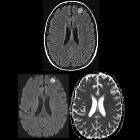cryptococcosis


Cryptococcosis is a fungal infection caused by Cryptococcus neoformans, a globally distributed fungus that is commonly found in soil, especially that containing pigeon and avian droppings. Infection is acquired by inhaling spores of fungus.
Epidemiology
Occurs worldwide without any defined endemic areas. Cryptococcal infections in humans likely occur when the organism is aerosolized and inhaled .
Clinical presentation
The lungs, central nervous system, blood, skin, bone, joints, and prostate are the most commonly involved sites.
It occurs predominantly in immunocompromised patients but can also be seen in the normal host :
- immunocompetent host: cryptococcal infections are commonly localized to the lung and the patients are asymptomatic
- immunocompromised patient: cryptococcal infections often cause symptomatic pulmonary infections and then often disseminate to the central nervous system, skin, and bones
In fact, central nervous system infection after haematogenous dissemination is more common than pulmonary infection.
Pathology
Markers
Serum cryptococcal antigen is helpful in diagnosis and follow-up of pulmonary and systemic disease. Antigen titers correspond to severity of illness. In CNS cryptococcosis, lumbar puncture is very helpful and shows increased CSF pressure, decreased glucose, increased protein, and mild to moderate leukocytosis. Indian ink test is highly specific and colors the thick round capsule of the yeast.
See also
Siehe auch:
und weiter:

 Assoziationen und Differentialdiagnosen zu Kryptokokkose:
Assoziationen und Differentialdiagnosen zu Kryptokokkose:
